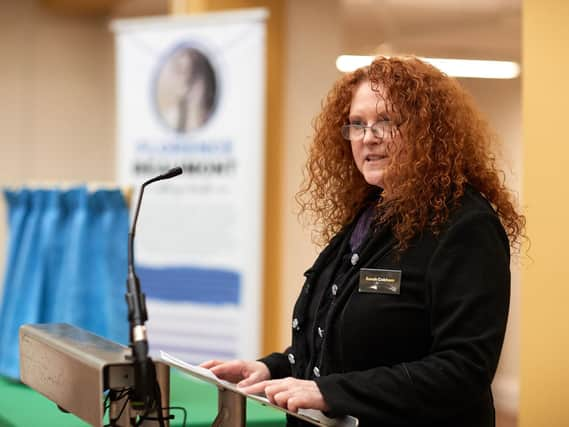Meet the 'forgotten woman' behind the beginnings of Wakefield's St John Ambulance
This article contains affiliate links. We may earn a small commission on items purchased through this article, but that does not affect our editorial judgement.


Champion of social justice. That’s how Lady Catherine Milnes Gaskell has been described by a group of researchers who have been delving into her rather impressive life as part of the Forgotten Women of Wakefield project.
Born in 1856, Lady Catherine spent much of her life supporting the health, education and well being of Wakefield’s poorest communities.
Advertisement
Hide AdAdvertisement
Hide AdShortly after arriving in Yorkshire as a new bride from her home in Shropshire, in the 1880s she set about supporting women and children less fortunate than herself.
According to researchers, she established what was called the Guild of Pity, which provided free milk to children in workhouses and distributed clothing to poor families and those of wounded soldiers.
She was also instrumental, the group say, in setting up a scheme which placed orphans in foster homes rather than leaving them to the workhouse.
Sarah Cobham, who leads the Forgotten Women project, designed to shine a light on those who played influential roles in the city’s past, picks up more of her story.
Advertisement
Hide AdAdvertisement
Hide Ad“By 1891 Lady Catherine was an established published essayist exploring the complex lives of women which were, unsurprisingly, received with some hostility by a male dominated press,” she says. “By the time of her death in 1935 she shared the same publishers as George Gissing and the Bronte Sisters and had published nine books and a host of articles and essays.”
Lady Catherine, who was awarded The Order of St John - a royal order of chivalry, also played a role in medical care in Wakefield. According to the Forgotten Women research, it was she who founded the Wakefield-based division of the St John’s Ambulance Brigade in 1911, which during the First World War delivered care at the city’s former Clayton Hospital.
“At [the division’s] registration, 70 men and 27 women wore their uniforms with pride,” Sarah says. “This uniform was provided by Lady Catherine and funded from the sale of Alpine plants grown in her garden.”
Lady Catherine, who died in 1935, was also among the first women to become A Justice of the Peace.
Advertisement
Hide AdAdvertisement
Hide Ad“The tenacity and grace that Lady Catherine shows is really impressive,” says Sarah. “Despite being faced with abject poverty within Wakefield, I can literally imagine her rolling her sleeves up and getting stuck in.
“I can really relate to her strategy which seemed to be to ‘find a way’ despite everything placed in front of her. This attitude clearly came from her mother, who was one of the first suffragists and advocates of women’s rights.
“What has become clear, through reading the research provided by Antonia Stephenson and Helga Fox, is that Lady Catherine worked alongside many of our other Forgotten Women. Once again, then, as now, it’s groups of women that are working together to support change for themselves, and others.
“I continue to be incredibly proud of the achievements of the women from our past and continually impressed with the skills, commitment and passion by the women in our present that continue enable the Forgotten Women of Wakefield project to flourish.”
Advertisement
Hide AdAdvertisement
Hide AdSarah has written a play - Lady Catherine - to be staged in December, alongside a talk on Lady Catherine’s life by Antonia. It will be part of an exhibition by the group - 1888 Supressed Suffragists: 2020 Visible Visionaries - that is due to take place at Wakefield Library from October.
For more stories from the YP Magazine and The Yorkshire Post features team, visit our Facebook page.
Editor’s note: first and foremost - and rarely have I written down these words with more sincerity - I hope this finds you well.
Almost certainly you are here because you value the quality and the integrity of the journalism produced by The Yorkshire Post’s journalists - almost all of which live alongside you in Yorkshire, spending the wages they earn with Yorkshire businesses - who last year took this title to the industry watchdog’s Most Trusted Newspaper in Britain accolade.
Advertisement
Hide AdAdvertisement
Hide AdAnd that is why I must make an urgent request of you: as advertising revenue declines, your support becomes evermore crucial to the maintenance of the journalistic standards expected of The Yorkshire Post. If you can, safely, please buy a paper or take up a subscription. We want to continue to make you proud of Yorkshire’s National Newspaper but we are going to need your help.
Postal subscription copies can be ordered by calling 0330 4030066 or by emailing [email protected]. Vouchers, to be exchanged at retail sales outlets - our newsagents need you, too - can be subscribed to by contacting subscriptions on 0330 1235950 or by visiting www.localsubsplus.co.uk where you should select The Yorkshire Post from the list of titles available.
If you want to help right now, download our tablet app from the App / Play Stores. Every contribution you make helps to provide this county with the best regional journalism in the country.
Sincerely. Thank you.
James Mitchinson
Editor